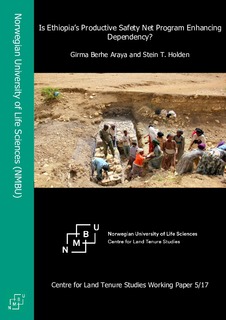| dc.contributor.author | Araya, Girma Berhe | |
| dc.contributor.author | Holden, Stein Terje | |
| dc.coverage.spatial | Ethiopia | nb_NO |
| dc.date.accessioned | 2018-01-31T13:13:23Z | |
| dc.date.available | 2018-01-31T13:13:23Z | |
| dc.date.issued | 2017 | |
| dc.identifier.uri | http://hdl.handle.net/11250/2481013 | |
| dc.description.abstract | Although development intervention programs can have far-reaching impacts beyond their stated objective, there have been few careful studies of unintended outcomes of such programs. This study assesses the impact of Ethiopia’s Productive Safety Net Program (PSNP) on household size and dependency ratio using the difference in differences method based on a panel data of four rounds over 12 years. Results show that member households in the PSNP have built a larger household size and dependency ratio than non-member households. These results are not only unintended by program designers but also worrisome as they potentially jeopardize the viability of the program in achieving its stated objective of enabling member households come out of poverty. | nb_NO |
| dc.description.sponsorship | NORHED | nb_NO |
| dc.language.iso | eng | nb_NO |
| dc.publisher | Norwegian University of Life Sciences, Ås | nb_NO |
| dc.relation.ispartofseries | CLTS Working paper;2017:5 | |
| dc.rights | Attribution-NonCommercial-NoDerivatives 4.0 Internasjonal | * |
| dc.rights.uri | http://creativecommons.org/licenses/by-nc-nd/4.0/deed.no | * |
| dc.title | Is Ethiopia’s productive safety net program enhancing dependency? | nb_NO |
| dc.type | Working paper | nb_NO |
| dc.subject.keyword | Households | |
| dc.subject.keyword | Consumers | |

